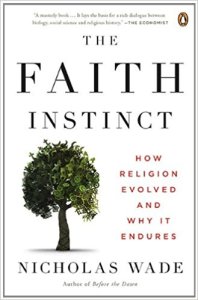Originally published August 27, 2017
The Faith Instinct: How Religion Evolved & Why it Endures, Nicholas Wade less than $15.00
Nicolas Wade is a science writer. He writes articles so that those without specialized degrees can achieve some sense of what it is that we have learned. I was quite taken with his book, Before the Dawn. I’ve checked my archives and, for whatever reason, I haven’t reviewed that book. Another bit for the to do list. Wade is currently in the middle of a rather public controversy regarding his latest book, A Troublesome Inheritance. He addresses race as a piece of our DNA heritage and shows why he feels it is important to identify who we are at the genetic level. Scientists who developed the work he uses in his analysis are not happy with his conclusions. Whatever the outcome, the argument is a bit like the battles over IQ; we are still not able to accept that some folks are better (or worse) at some things, but that does not make them better (or worse) people. Well, back to the discussion at hand.
One does not have to be a non-believer to subscribe to scientific evidence of evolution. I don’t believe I have seen anything specific on whether Wade adheres to a faith of any flavor, however the book is written from the view point that faith is a social interaction shaped and formed by the requirements of the society and culture in which it grows. Some scientists entertain similar thoughts, others are quite reluctant. Let’s look at Wade’s central hypothesis and see what that tells us about religion, culture, and ourselves.
Wade begins his analysis with what anthropology has learned about the earliest forms of religion, some aspects of which we can see in the few cultures of today that have not experienced the onslaught of modern intervention. Basically, group activity such as singing, dancing, and music making. These activities draw a society together and inspire the desire to risk one’s own life for the safety and success of the group as a whole. Anthropologists are divided on a theory that the development of religion can be thought of as “group evolution.” In other words, did this growing change occur, not as a survival tool of the individual (especially since it often demands personal sacrifice), but as a tool for the survival against other groups which were less cohesive. It is an interesting thought journey.
In addition to the binding of a group into one based on these sometimes very intense group activities, Wade adds the consideration of a moral code. Sometimes, to get folks to obey rules that are structured towards group survival rather than individual survival (don’t steal, murder, sleep with someone else’s spouse), it becomes important to put the enforcement aspect in the hands of a supernatural entity. First, because he/she/it can be given an all-seeing, all-knowing presence, and secondly to remove the punishment of infractions from the hands of a priest or leader who could become the target of retaliation. A study conducted by Jared Piazza at the University of Kent discovered that he could reduce the frequency of cheating in small children of a certain age by introducing an invisible Princess Alice to watch over them. His work is quite interesting in regards to the development and enforcement of moral codes.
According to Wade, as societies became more complex, and knowledge spread, the structure of religion became more complex. Not only did the faith instinct drive the level of warm bodies in the pews, it became a way of preparing young people and nations for the sacrifice required to go to war. By creating and holding the loyalty of individuals to group goals, nations were able to get sizable numbers of their populations to surrender the need to protect self and immediate family to a greater goal of protecting the nation. An unbiased look at our history of wars that involved devotion to one religion or another—or even a sect or denomination within religions—shows us that emotions run highest when our religious beliefs or doctrine are challenged. When religion is not the key element, nationalism (an extended form of family) becomes the glue of society.
Wade develops an interesting topic, and one that helps us understand a bit of how cultures and civilizations manage to meld persons of varied backgrounds into a functioning society prepared to defend whatever the core beliefs may be against “others.” The part that becomes worrisome to me is developed in the last few chapters, most specifically, Religion and Nation.
For the most part, modern nations have developed around common societal goals and history. Common language, common ethics, and common ethnicity. The earliest settlers (invaders) of America along the Eastern Seaboard, were predominately Protestant. Having left behind religious persecution of one form or another, they sincerely believed they were involved in a divine cause. Consequently, they went about life in their new home in a rather biblical way—clearing the home they chose to create of anyone or thing not included in their vision of a holy land of destiny. Problem is, they were late arrivals on a continent filled with peoples who had arrived over the course of a long history, some nearly as recent as they, and some that arrived in multitudes in the ensuing centuries. The battle for the heart and soul of a new society waged for many decades; and that battle has yet to be resolved. It is important to note, whatever version of American history a Christian may see, by 1776 only 17 percent of the population belonged to a church. Current day evangelical beliefs were not even on the horizon.
Sociologists look to a couple of theories to explain the level of religious participation in modern countries. If a country was born in insecure times, or is still suffering from economic, health, or political insecurity, then the population tends to be more religious. This does, in some ways, fit the American landscape since many of the arrivals on these shores came because of religious, ethnic, or economic persecution. Another explanation of the rise and fall of denominational loyalty comes with a “marketplace” analysis. Throughout the history of religion, a new idea or doctrine finds enough adherents and structure to become the orthodoxy of the age and then begins to slip in “market share” as new and younger sects become aggressive in acquiring faithful members. Some scholars look to falling numbers in church attendance in Europe as being due in part to established churches. Here salaries and facility maintenance are guaranteed and there is no need to seek new members for fresh cash flow.
But these analyses only go so far on the American landscape of nationalism. Per Wade, “The usual glues that hold nations together are a single dominant religion, language, ethnicity and culture. Until 1850 or so, the United States fitted this mold, being essentially an Anglo-Protestant culture. Many of its people originated from England, Scotland or Northern Ireland, and other Europeans became American by adopting at least the language of Anglo-Protestantism.” That is, if we leave out consideration of the nations the new arrivals replaced. As of today, however, there are many ethnicities, religions, languages, and cultural histories. What, then, was the glue the kept Americans from breaking out in multiple civil wars, such as the centuries-old battles of Northern Ireland?
Wade proposes that it is an American Civil Religion, a shared belief in the vision that was America. A country that believed to its core that “all men are created equal, that they are endowed by their Creator with certain unalienable Rights, that among these are Life, Liberty and the Pursuit of Happiness” (Constitution of the United States). For some time, although the road was very bumpy and the price was paid with many lives, we sincerely believed in the vision. Even in times of ignorance, there were those among us that fought for the over-reaching belief in a unified humanity, and a deep-seated respect for individual rights and obligations. We worshiped a vision that always seemed just a bit further down the road. Wade sees the glue of the American nation as a belief in “specialness,” in being the ones that can achieve what human societies have failed to do in the past: equality of opportunity, respect for differences, freedom to express. What Wade does not address, and perhaps did not see coming, was that something happened on our way to the vision.
Sadly, and this is a personal opinion, the vision has morphed into something that the Founding Fathers were most likely trying to avoid. The prevailing “religion” of the country is no longer a faith of giving, loving, and supporting. It is not even a faith of the Puritan heritage of work to eat, monogamy, and respect of a neighbor’s property. Now, we believe it is perfectly okay to enforce our beliefs on others. There are many that fear Sharia Law because it is affiliated with Islam and yet insist similar practices and judgement should be instituted under the name of Christianity. We worship the current resident of the White House as if he walks on water (he does not) and many of us steadily refuse to see any opinion that does not fit in our worldview. Somewhere along the line we decided we were the moral compass of the world and no longer cared about the accumulated wisdom of more ancient civilizations. There was a time when we valued education in order to understand the successes and failures of previous civilizations. America built some of the most prestigious schools in the world. Now statistics indicate that a large portion of us see education as an elitist pursuit and blame the universities for fostering liberal attitudes and “un-American” activities.
Religion, and faith, is a powerful tool, both for and against the members of a society. Belief in something is often what drives us, inspires us, to do our best, or worse. Be ever so careful of just what it is that you place at the center of your faith universe. I leave you with a few quotes from the American philosopher, Eric Hoffer. Author of True Believer.
We lie the loudest when we lie to ourselves.
Absolute faith corrupts as absolutely as absolute power.
Hatred is the most accessible and comprehensive of all the unifying agents. Mass movements can rise and spread without belief in a god, but never without a belief in a devil.



No Comments